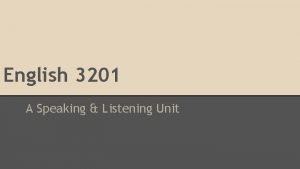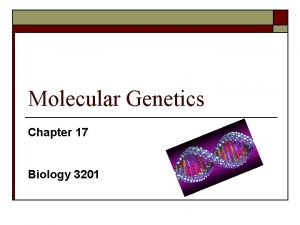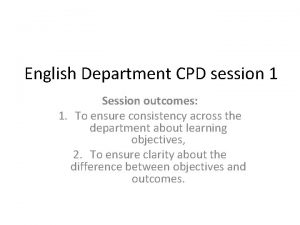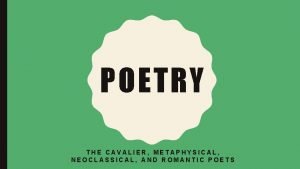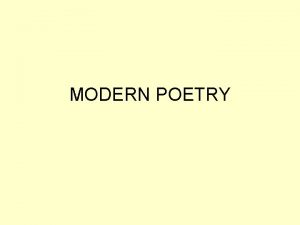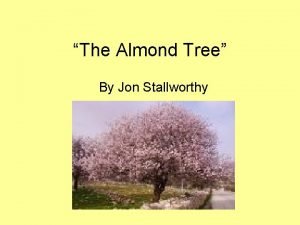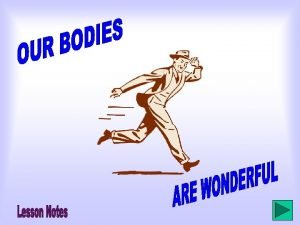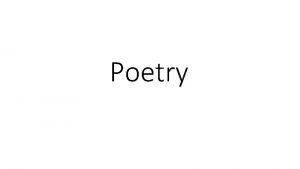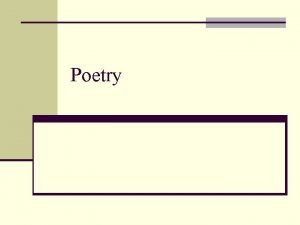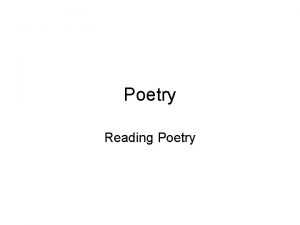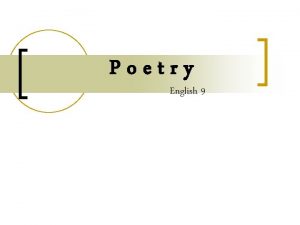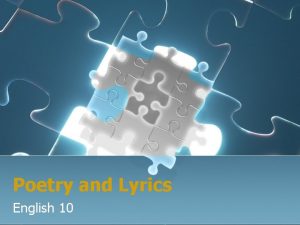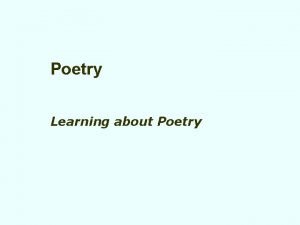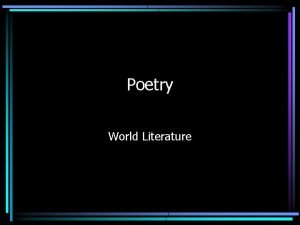English 3201 Poetry Outcomes In this lesson you













- Slides: 13

English 3201 Poetry

Outcomes In this lesson you will focus on the following: Parallel Structure Repetition Imagery Application of contextual elements

Prerequisites Definitions for: parallel structure, repetition and imagery from your notes Joy Kogawa’s personal history. Check out the following site: http: //quarles. unbc. ca/kbeeler_html/rese arch/kog 1. html Info. regarding the evacuation and internment of Canadians of Japanese descent in World War II. Check out the following site: http: //www. infoplease. com/spot/internme nt 1. html

Parallelism is "similar constructions or treatments placed side-by-side for effect. The following is an example of parallelism: "In the beginning Wayne Gretzky laced up his skates for Canada. In the first period he had scored two goals. By the end of the game he had a hat trick. "

This is an example of grammatical parallelism. The repetition of the pronoun "he" maintains consistency throughout the brief paragraph. It also provides emphasis for the subject's dominance of this particular game.

Imagery is defined as both the pattern of images in a work and all language used to represent objects, actions, feelings, thoughts and so on.

Repetition is simply the effect that repeating lines or phrases which contributes to the emphasis of the poet's theme.

Other Important Terms: Irony Point of View Theme Please terms review your notes for these

"Where There's a Wall“ by Joy Kogawa p. 20, Echoes 12 Prior to reading the poem research the following items: ◦ Joy Kogawa's Life History http: //www. joykogawa. ca/ ◦ The Evacuation and Internment of Canadians of Japanese Descent in World War II http: //www. infoplease. com/spot/internment 1. ht ml

"Where There's a Wall“ by Joy Kogawa p. 20, Echoes 12

"Where There's a Wall“ by Joy Kogawa p. 20, Echoes 12 Answer the following questions: 1. ) What is the significance of the title "Where There's a Wall"? Support your response with evidence from the poem. 2. ) #3 on p. 28 in Echoes 12. 3. ) How does the background information regarding the evacuation of Japanese Canadians contribute to your understanding of the poem?

"Where There's a Wall“ by Joy Kogawa p. 20, Echoes 12 4. ) Using the information provided in the previous questions develop a theme for the poem "Where There's a Wall". Support your answer with two (2) references to the text.

Great Poetry Resources: http: //www. shmoop. com/poetry/
 English 3201
English 3201 Satu data kesehatan
Satu data kesehatan Biology 3201 textbook
Biology 3201 textbook Learning outcomes example
Learning outcomes example Proseracer
Proseracer Elements of spoken word poetry
Elements of spoken word poetry Cavalier poetry definition
Cavalier poetry definition Traditional poetry vs modern poetry
Traditional poetry vs modern poetry Non narrative poems
Non narrative poems Augustan poetry vs romantic poetry
Augustan poetry vs romantic poetry Almond trees poem
Almond trees poem You say you love the rain
You say you love the rain You are what you eat do you agree or disagree
You are what you eat do you agree or disagree If you think you can you can poem
If you think you can you can poem
